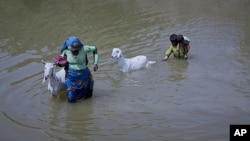A senior official from the World Food Program warns floods in Pakistan will continue to wreak havoc on the population if disaster prevention strategies are not enacted.
The World Food Program’s executive director for operations, Ramiro Lopez da Silva, says regions such as Sindh province are suffering from years of neglect and lack of development. He says this makes them particularly vulnerable to natural disasters.
“When you visit these areas like I did, you get a bit of a sense of despair from these populations,” he said.
Lopez da Silva says the provincial government of Sindh told him more than eight million people have been affected by the recent floods.
WFP’s own assessment, he notes, indicates five-and-a-half million people are severely affected and some three million are threatened by starvation. He says these people, who mainly rely on cash crops, such as cotton will remain without an income until the waters recede and the next crop is harvested.
“Now you have a situation where two-thirds of the crops in that region are under water," said Lopez da Silva. "So, that population lost the income of this year and will have access to income only after the monsoon of next year, if the monsoon does not generate floods. So, it is a terrible situation from a humanitarian viewpoint.”
About 20 million people were affected by the monsoon floods, which struck Pakistan in 2010. Then, as now, the hardest-hit area was Sindh Province.
Lopez da Silva says lessons were learned from last year’s disaster. But, he says he does not think the government fully grasps the magnitude of the problems and is not taking the actions required to prevent this kind of devastation from recurring on a regular basis.
He suggests two types of investment, which should be made to blunt the impact from the floods. One involves an investment in, what he calls, hardware. This requires engineering skills to modernize the network of decades-old canals in Sindh. In addition, smaller canals, which have been neglected for a long time, need to be re-designed and maintained.
The WFP official says investments also need to be made in developing software.
“And that is working to address the vulnerabilities of the population," said Lopez d Silva. "And, that requires a concerted effort-an investment on health, education, food security, nutrition. So, these populations become more resilient and self-sufficient in situations like the situation they are confronted with today. And that is why the hardware is a “quick fix,” the software is a deliberate effort over the years requiring political will and political commitment.”
WFP Executive Director Lopez da Silva calls the hardware a "quick fix," whereas the software requires determined political will and political commitment.
He concedes these disaster prevention measures will be expensive. But in the long run, he says, these actions will prove to be very cost-effective in minimizing the damage to crops, property and livelihood. And, more importantly, in saving lives.
WFP Urges Pakistan to Enact Disaster Prevention Strategies









